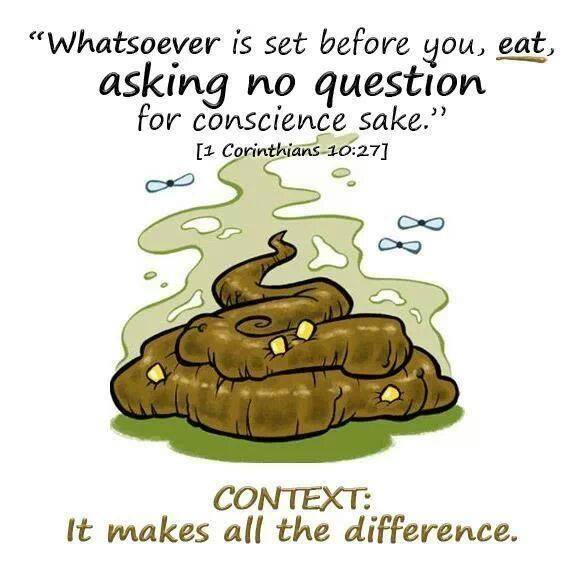Do you know what the biblical term “under the law” means? Most mainstream Christians think it means one thing, but, in reality, it means something else. Understanding the true meaning of this phrase will affect your spiritual walk and relationship with Yeshua (Jesus). When the Apostle Paul uses this term, is he taking a stand for or against the Torah-law of Moses? This video answers these questions.
Tag Archives: Paul
Eat whatever’s put before you!??!?? (Yeah right!)
Do you really think that Paul the apostle meant we should eat whatever is put before us when he made this statement (see graphic below) in 1 Cor 10:27, even if it violated the biblical dietary commandments? Yet many in the church will use this Bible verse to attempt to prove the biblical dietary laws — along with the rest of the Torah-law of Moses — have been “done away with.” Hey church, it’s time to start using your noggins a little instead of thinking with your belly!
(This graphic was sent to me via Facebook and was too good to pass up, yet I don’t know whose graphic it is. If someone knows, please let me know, so I can properly attribute it.)
Following YHVH Can Be Tough on Marriages
Genesis 22:19; 23:2, Abraham dwelt at Beersheba…Sarah died in…Hebron. At this point, Abraham and Sarah lived in two separate towns some 50 miles apart. Why was this? The Scriptures don’s say, so we can only speculate. Perhaps the trial of Abraham’s faith in the previous chapter where YHVH asked him to sacrifice Isaac and Abraham’s compliance to do so put such a strain on their marriage that they separated. Perhaps the idea that YHVH would ask Abraham to sacrifice their only son was so hard for Sarah to believe that she questioned whether Abraham had even heard correctly from YHVH about this.
 Whatever the case, following YHVH can be tough on marriages and families as Yeshua notes in Matthew 10:34–39. Sometimes families split as a result. Abraham wasn’t unique in his situation.
Whatever the case, following YHVH can be tough on marriages and families as Yeshua notes in Matthew 10:34–39. Sometimes families split as a result. Abraham wasn’t unique in his situation.
In Exodus 4:24–26, in all likelihood, Zipporah and Moses split up over YHVH’s request to circumcise their two sons, for we never hear of Zipporah again, except that Moses had sent her away (Exod 18:2). Some Bible scholars take this mean that he put her away or divorced her (likely because of her refusal to follow him onto the mission field). Later, we find Moses remarrying a Cushite woman (who was likely black; Num 12:1).
David had to leave his first wife Michal, the daughter of Saul, because she despised him for dancing before YHVH’s ark of the covenant (2 Sam 6:14–16, 23).
The situation with the prophet Hosea is notable, as well, in this regard. YHVH required him to marry a wife of harlotry as part of his spiritual walk, so that he would better understand the experience of YHVH who was married to the adulterous nation of Israel. Hosea didn’t even know whether the children born to his wife were his own, or those of another man, yet he was to love her unconditionally anyway.
In the apostolic era, we hear virtually nothing about the wives of the apostles. This in no way indicates that their marriages were troubled, but one can only wonder given the rigors of the spiritual assignment YHVH had given them.
Paul is a case in point. He was likely married, since it would have been uncommon for someone of his spiritual stature to not to have been married in the Hebraic culture in which he lived, yet no mention of his wife is made. At the same time, he mentions a thorn in the flesh to buffet him and to keep him humble (2 Cor 12:7). On can only wonder if this isn’t a reference to a difficult marriage situation. Perhaps his wife became antagonistic at his conversion to Yeshua resulting in his leaving the prestigious and affluent life of the religious elite of his day, and counting his past life as dung (Phil 3:8). This may have been too much for her to bear.
Paul Says Keeping Torah Is Just as Easy as Following Yeshua!
Deuteronomy 30:11–14, Does YHVH’s Torah set an impossible standard by which we are to live? If so, we are logically compelled to ask ourselves this question: Would a righteous and just Creator who is a loving Heavenly Father give to his chosen people and children a set of standards that were humanly impossible to perform, then curse them for their inability to meet these standards? If so, then we must face the fact that Elohim is an unjust and a wicked tyrant! This simply is not true!
If Torah isn’t an impossible standard to follow, then what is the Torah’s purpose in our lives, and why does the Creator impose the Torah upon his people? We believe that the Torah sets a standard of faith, trusting in Elohim, and that if followed it provides a system of repentance and sacrifice for obtaining forgiveness from Elohim and restoring a condition of being considered righteous in his sight. The Torah also teaches man how to achieve peace on earth and good will toward men by showing humans how to love Elohim with all their heart, soul, mind and strength and their neighbor as themselves.
Paul quotes this same Deuteronomy passage in Romans 10:6–8 where he relates the Written Torah to Yeshua, the Living Torah or Word of Elohim incarnate (in the flesh). (Compare with John 1:1, 14.) He shows that they are one in the same and that Messiah Yeshua, through his life, came to reveal to man the righteousness of the Torah-law. This righteousness is available to us if we will but have a heartfelt faith in him (Rom 10:4, 9–10) and allow him to live out his righteousness in us through the empowering work of the Spirit of Elohim. In verses 11 through 21, Paul goes on to relate this very truth to being the central message of the gospel that Isaiah prophesied would be preached to redeem both houses of Israel to Yeshua their Messiah (Isa 52:7). Furthermore, in Romans 10:4 Paul reveals that Yeshua is the end goal, target of or the full flowering or embodiment of the Written Torah in human form.
Yeshua in Us: The Power to Obey Torah
Philippians 1:11, The fruits of righteousness which are by Yeshua the Messiah. It is impossible for a man to keep the Torah on his own strength as Yeshua’s encounter with the rich young ruler proves (Matt 19:16–22). When the young man asked Yeshua what he must do to have eternal life, Yeshua seems to set the man up for a fall when he declares, “If you want to enter into life, keep the commandments.” Yeshua is not being disingenuous here. Were one to keep the Torah perfectly without sinning, hypothetically, one would not fall under the death penalty for violating the laws of Elohim (i.e., sin). Presumably one could earn eternal life by one’s own good works. But no man has ever accomplished this superhuman feat except the superhuman Yeshua! Continuing, when the young ruler proudly declares his perfect Torah obedience, Yeshua shows him that he was, in fact, violating the Torah in at least one area—covetousness and greed. Yeshua shows him how to come into Torah compliance, and then admonishes him to come and to follow him. What Yeshua is teaching here is that it’s impossible to keep the Torah perfectly without factoring Yeshua, the Living Torah, into the equation. The point that we can’t keep the Torah without Yeshua directly intervening in our lives, I hope to conclusively demonstrate below.
One way that Yeshua helps his followers obey the Torah is by sending us his Spirit as an internal spiritual force into our hearts to nudge and lead us into Torah-obedience.
What’s more, Yeshua also gives us the divine gift of his grace to accomplish the same thing. His grace removes the guilt, stain and penalties for our past sins, and with a clear conscience and a clean spiritual slate before YHVH, minus the past baggage of sin weighing us down, we are able to go forward under the power of YHVH’s Spirit to walk in accordance with his Torah. Praise Yeshua! An illustration of this would be a runner who trains wearing a backpack filled with rocks. Once the weight is removed from his back, when he runs, he feels as if he were flying through the air.
Our faith in, love for and continual abiding in Yeshua is the key to receiving his systemic spiritual empowerment to walk a life that mirrors Yeshua. Paul invites us Continue reading
What Does the Phrase “Under the Law” Mean?
This brief teaching is the summation of 40 years of studying what it means to be “under the law.” It’s a hot-button phrase that is repeated often in the Torah-phobic Babylonian church system. Though this article is a little technical at times, reading it will show you how to answer your Christian friends who think you’ve gone off the deep end and fallen from grace with all this Hebrew roots, Torah stuff. Get your Bible out, roll up your sleeves and let’s go deep… Enjoy!
An Analysis of the “Under the Law [Torah]” Passages in the Testimony of Yeshua
Romans 3:19, Now we know that what things soever the law [Torah] says, it says to them who are under the law: that every mouth may be stopped, and all the world may become guilty before Elohim.
Explanation: The Jews were self confident in their special relationship with YHVH because (a) they were Jews and the seed of Abraham, (b) because YHVH had given them the Torah, and (c) because they were circumcised, yet many had failed to obey the Torah, thus making their outward appearance of righteousness (i.e., their circumcision) a pointless sham. Whether one is uncircumcised or not is immaterial; rather, what matters to YHVH is one’s heart orientation toward him (i.e., is one circumcised in heart or not, Rom 2–3:4). After all, circumcision can’t be a salvation issue, since it’s impossible for one half of humanity to be circumcised, while the entire population (both men and women) can be circumcised in heart!
Paul was being accused of promoting Torahlessness because of his stand that circumcision was not a salvation requirement, and that a Jew who is circumcised, and yet lives a Torahless life is no better than a Gentile sinner. In fact, an uncircumcised Gentile who follows the basics of the Torah that are written in his consciences will be blessed on the day of judgment (Rom 2:14–16).
Paul is attempting to level the spiritual playing field (or to tear down the middle wall of partition) between Jews and Gentiles by showing that a hypocritical, law-touting, circumcised Jew has no standing in righteousness before YHVH, while an uncircumcised Gentile who knows little about the Torah, yet follows the light of truth that he has with his whole heart has righteous standing before YHVH.
The bottom line is that Continue reading
Paul the Pro-Torah Apostle
Paul the apostle strongly upheld and defended the validity of the Torah as defining the path of righteous for the redeemed believer in numerous places in his writings (Rom 3:31; 7:7, 12, 14; 13:8–10; 1 Cor 7:19; 9:21; Gal 3:10; 6:2; 2 Tim 6:14; Tit 2:14). What’s more, he even claimed to follow the Torah himself (Acts 21:24; 24:14; 25:8; 28:17; 1 Cor 9:21).
Not only that, Paul claimed that he himself was NOT without the Torah of Elohim, but that he was actually “under the Torah toward Christ” (1 Cor 9:21). Yes, Paul was “under the Torah.” That’s what the Bible says! He wasn’t under the Torah by trying to earn his salvation through his good works. Neither was he under the penalty of the Torah that occurs when we sin by violating the Torah. Yeshua had washed his sins away and taken that penalty upon himself when he died at the cross. Rather, Paul was following the Torah through faith in Messiah, and through the power of the Holy Spirit living in him. The hard and stony heart of rebellion against the laws of Elohim had been cut away and he had been given a new heart to wholly love and obey YHVH.
To claim that Paul teaches the abrogation of the Torah-law given to Moses and the Israelites by YHVH Elohim is setting the Word of Elohim in opposition to itself and replacing the truth of the Bible with men’s traditions. This is sin, rebellion and secular humanism in its rawest form and is nothing more than a perpetuation of the lie of the serpent (the devil) when he questioned the Word of Elohim at the tree of knowledge in the garden and he asked man the question, “Hath God indeed said…?” (Gen 3:1). Ever since then, rebellious man has been trying to do an end-run around the Torah-Word of Elohim. Paul describes this mentality to a tee in Romans 8:7–8,
Because the carnal mind is enmity against God: for it is not subject to the law of God, neither indeed can be. So then they that are in the flesh cannot please God.
Anyone who claims that Paul came to unhinge Torah-obedience from the walk of the redeemed believer has sadly bought into the unbiblical and anti-Semetic theological lies and traditions of the church system, which are nothing more than traditions of men by which the word of Elohim has been made of none effect. This seems to be a recurring spiritual disease of religious institutionalism, for Yeshua accused the religious elite of his day of the same thing (Matthew 15:3–9 and Mark 7:7–9).
The religious folks of Yeshua’s day didn’t like his stinging rebukes in this regard any more than they do today. They first murdered him with their mouths, and then they murdered him physically instead of repenting of their sinful (Torahless, 1 John 3:4) ways. To be sure, murder with the mouth goes on today against those who stand for truth (see John 16:2).
At the present time, YHVH is calling his people out of spiritual and religious Babylonism (Rev 18:4), which contains a mixture of sublime Bible truth and toxic demonic doctrines of demons going back to the serpent in the garden. YHVH is preparing for Yeshua his Son a bride whose robes will be without the spot of sin (Torahless, 1 John 3:4), and who will be those who keep the commandments of Elohim and have the faith or testimony of Yeshua (Rev 12:17; 14:12). They are in love with Yeshua and they demonstrate this by keeping his Torah-commandments (John 14:15).






